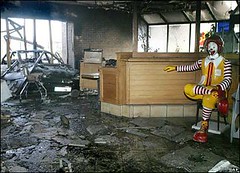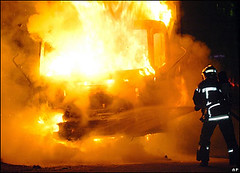Effects of Globalization and Racism On France
After two weeks of violence in France's city suburbs, the riots seem to be slowing down. According to National Police Chief Michel Gaudin, only 482 cars were burned and 203 people arrested last night. This does not indicate an end to the violence, but compared to 617 torched cars and 330 arrests the night before, it does signal a "significant decline." Now is the time to clear away the rubble and begin the careful analysis of the French restlessness among its immigrant population.Having voted against the EU Constitution earlier this year, French citizens, both native and immigrant, largely rejected the trends of increased globalization and marginalization of its workers. This was also hailed as a cultural victory for French nationalization over European assimilation and a damning referendum on President Jacques Chirac's economic and social policies. This explains the general unrest in France, but not in its immigrant population. The immigration problem hinges on the tenets of French egalitarianism.
As Robert Levin once put it:
France is fairly egalitarian - for Frenchmen. You have to be a Frenchman, or become one.

- Mass immigration did not occur in France until after World War II, when huge numbers of North Africans began to flee there. Muslims make up 5-10% of France's 60.7 million people.
- France expects immigrants to assimilate. In schools, standard history curriculum begins with "our ancestors, the Gauls," no matter where the students came from. Affirmative action is so controversial because it undermines the ideal of a "nation of legally indistinguishable individuals."
- French economic policies are fixed around protecting and preserving its culture. This includes limited working hours, large social welfare benefits, sheltered industries (especially farming), and restrictions onentrepreneurss and free competition. These policies have helped contribute to the 40% jobless rate in many immigrant neighborhoods.
While unusual in their scope, the riots are in not unprecedented. A similar "intifada of the cities" broke out 15 years ago in response to the same conditions in the banlieues, or suburban ghettos, where a lack of educational and employment opportunities and dismal housing conditions created, in the words of then-Paris Mayor Jacques Chirac, a "reign of soft terror" that left young people with little choice but "to revolt."Perhaps this will begin the dialogue in ending this cultural clash before it takes hold in other European nations. The violence of the rioters is indefensible, but their frustration is not. The immediate need to restore order will only solve the current crisis, but not the long-term quandary that France and ultimately, the rest of the world, faces.
The state could maintain its policy of trying to keep the order while band-aiding the endemic problems, but for how long?
We now know the answer. Days after Interior Minister Nicolas Sarkozy announced a "war without mercy" against crime in France's ghettos, two young Muslim teenagers were electrocuted while hiding in a power substation from police, sparking the violence of the last two weeks. They hid in such a dangerous place precisely to escape a police force - and a state - that has long viewed most poor Africans and Muslims as the kind of "criminals and other troublemakers" upon whom Sarkozy had declared war.Now that he's president, Chirac can no longer speak of the terror caused by government policies and societal neglect. Instead he argues that "the Republic is completely determined to be stronger than those who want to sow violence or fear." Similarly, Prime Minister de Villepin argues that "order and justice will be the final word in our country."
What both men cannot acknowledge is that in the banlieues , the "Republic" can be the very source of the violence and fear its leaders are now trying to overcome. As Chirac once understood, the young rioters cannot be blamed for concluding that when "justice" and "order" are incompatible, the only way to achieve the former is to bring disorder to the Republic as a whole. Indeed, after a week and a half of violence, the government decided to "restore" and even increase funds for much-needed reconstruction, education and similar projects.



0 Comments:
Post a Comment
<< Home